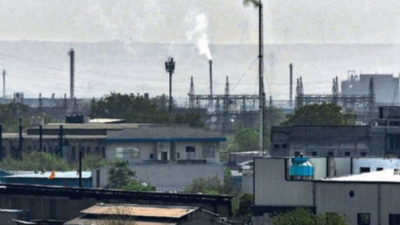- News
- City News
- gurgaon News
- Haryana: Before penalty, 500 Panipat factories shut operations
Haryana: Before penalty, 500 Panipat factories shut operations

Most of the industrial units that shut their operations in Panipat, preempting at least a heavy fine, are dyers or deal with rubber
GURUGRAM: Fearing hefty penalties, 500 factories running on coal — about 2% of all industrial units — in Panipat have suspended operations, alleging that they could not have shifted to cleaner fuels by the September deadline due to supply and monetary issues with PNG and biomass.
They have now warned of an NCR-wide protest, starting October 13, if they are not given any reprieve.
In the two days since the Graded Response Action Plan (GRAP) for winter air pollution came into effect, only 40% of the 7,000-odd industrial units in Gurugram, Manesar and Faridabad have switched to the cleaner alternatives. There are around 2,769 highly polluting coal-based industrial units in Haryana.
GRAP, facilitated by the Commission for Air Quality Management (CAQM) in NCR and adjoining areas, was put into place in 2017 to fight the annual winter air pollution. As temperatures fall, so does the air quality in the region; cold air suspends pollutants released from farm fires, and emissions from industries and vehicles, resulting in toxic haze.
In June this year, CAQM – the expert body tasked with deciding the anti-pollution plan – gave industries time till September 30 to shift to alternative fuels in the hope of lowering emissions.
Most of the industrial units that shut their operations in Panipat, preempting at least a heavy fine, are dyers or deal with rubber.
“We had no option but to shut down the work because if found violating the norms, we will have to pay Rs 1 crore and/or get a jail term of up to 5 years as per the rules. We are not doing anything illegal, why should we be forced to pay such a huge fine,” Bhim Singh Rana, president of the Panipat dyers’ association, said on Sunday.
He added that the self-closure of the factories will affect 7 lakh employees. There are around 25,000 industrial units in Panipat, of which 20% have moved to PNG and 40% to biomass.
When asked why some of the units had not shifted to PNG, Rana said that the prices of gas have risen this year, and getting a connection wasn’t easy. “Metres are unavailable for PNG connections and the infrastructural requirements like burners and thermopac are not available in India,” the association leader said.
In Gurugram, including its industrial constituent Manesar, and Faridabad, compliance with this rule was low as well. Around 2,800 units of the total 7,000 in the two districts had shifted to PNG or other fuels. Industries said they are holding meetings with factory owners across NCR to escalate the issue.
“PNG connections aren’t available everywhere as the pipelines have not been laid. Waiting period for a connection is also about three months. We have written to the Haryana CM explaining the issue,” said JN Mangla, president of the Gurugram Industrial Association.
“Switching a factory to other forms of fuel is a critical job. One needs to spend crores on it… ” added Pawan Yadav, president of IMT Manesar Industrial Association.
PNG suppliers deny concerns over availability. “We are providing connections as quickly as we can. During the monsoon season, we do not get approval in Gurugram to dig, and that’s why some might feel that the process was delayed,” an IGL official said
“We have connectivity everywhere in Gurugram. In some cases, there was a delay in delivery of metres due to sudden demand in NCR,” said Rahul Chopra, managing director at Haryana City Gas.
State pollution control board officials said they hope industries will comply with the rules.
“Those who do not shift to approved clean fuels will face action as per the policy,” said P Raghavendra Rao, chairman, Haryana State Pollution Control Board and a member of the CAQM expert committee.
They have now warned of an NCR-wide protest, starting October 13, if they are not given any reprieve.
In the two days since the Graded Response Action Plan (GRAP) for winter air pollution came into effect, only 40% of the 7,000-odd industrial units in Gurugram, Manesar and Faridabad have switched to the cleaner alternatives. There are around 2,769 highly polluting coal-based industrial units in Haryana.
GRAP, facilitated by the Commission for Air Quality Management (CAQM) in NCR and adjoining areas, was put into place in 2017 to fight the annual winter air pollution. As temperatures fall, so does the air quality in the region; cold air suspends pollutants released from farm fires, and emissions from industries and vehicles, resulting in toxic haze.
In June this year, CAQM – the expert body tasked with deciding the anti-pollution plan – gave industries time till September 30 to shift to alternative fuels in the hope of lowering emissions.
Most of the industrial units that shut their operations in Panipat, preempting at least a heavy fine, are dyers or deal with rubber.
“We had no option but to shut down the work because if found violating the norms, we will have to pay Rs 1 crore and/or get a jail term of up to 5 years as per the rules. We are not doing anything illegal, why should we be forced to pay such a huge fine,” Bhim Singh Rana, president of the Panipat dyers’ association, said on Sunday.
He added that the self-closure of the factories will affect 7 lakh employees. There are around 25,000 industrial units in Panipat, of which 20% have moved to PNG and 40% to biomass.
When asked why some of the units had not shifted to PNG, Rana said that the prices of gas have risen this year, and getting a connection wasn’t easy. “Metres are unavailable for PNG connections and the infrastructural requirements like burners and thermopac are not available in India,” the association leader said.
In Gurugram, including its industrial constituent Manesar, and Faridabad, compliance with this rule was low as well. Around 2,800 units of the total 7,000 in the two districts had shifted to PNG or other fuels. Industries said they are holding meetings with factory owners across NCR to escalate the issue.
“PNG connections aren’t available everywhere as the pipelines have not been laid. Waiting period for a connection is also about three months. We have written to the Haryana CM explaining the issue,” said JN Mangla, president of the Gurugram Industrial Association.
“Switching a factory to other forms of fuel is a critical job. One needs to spend crores on it… ” added Pawan Yadav, president of IMT Manesar Industrial Association.
PNG suppliers deny concerns over availability. “We are providing connections as quickly as we can. During the monsoon season, we do not get approval in Gurugram to dig, and that’s why some might feel that the process was delayed,” an IGL official said
“We have connectivity everywhere in Gurugram. In some cases, there was a delay in delivery of metres due to sudden demand in NCR,” said Rahul Chopra, managing director at Haryana City Gas.
State pollution control board officials said they hope industries will comply with the rules.
“Those who do not shift to approved clean fuels will face action as per the policy,” said P Raghavendra Rao, chairman, Haryana State Pollution Control Board and a member of the CAQM expert committee.
FOLLOW US ON SOCIAL MEDIA
FacebookTwitterInstagramKOO APPYOUTUBE
Start a Conversation
end of article









